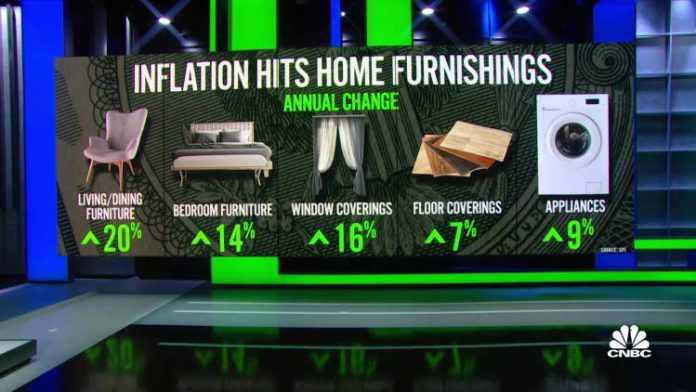Customers look at appliances for sale at a Best Buy store in Miami, Florida, Oct. 8, 2021.
Joe Raedle | Getty Images
Sara Rathner didn’t want to replace her clothes dryer. But a part was clearly broken, causing the machine to make a high-pitched squealing sound every time she dried a load of laundry.
“We called an appliance repair company and he came and he replaced the component,” said Rathner, a travel and credit cards expert at NerdWallet who lives in Richmond, Virginia.
However, the machine broke for the same reason again a few months later, and then again shortly after that. After the mechanic’s third visit, Rathner said he told her, “You need to stop calling me and just buy a new dryer. I cost you $250 every time I show up. One more visit, you could have just bought a new dryer.”
More from Personal Finance:
How home buyers and sellers can negotiate commissions
Aspiring homeowners say they face two major obstacles
93% of women are stressed about money
‘The appliance upgrade cycle has shortened’
Household appliances are becoming more modern and high-tech, but — as Rathner found — they don’t last like they once did.
In fact, homeowners are purchasing large appliances, including washing machines, dryers, dishwashers and refrigerators, more often compared with 15 years ago, according to an analysis by Zonda Media, a housing market research and analytics firm.
From 1995-2005, the average homeowner replaced appliances consistently every 12 to 13 years. Today it is every eight to nine years, noted Todd Tomalak, Zonda’s principal of building products research.
At the same time, they are spending more than before.
Homeowners spend about 34% more on appliances than they did 15 years ago, “above and beyond inflation,” Tomalak said.
“Homeowners are purchasing appliances with more bells and whistles, but which become obsolete sooner and have more aspects to repair versus appliances years ago,” he said.
“As a result, the appliance upgrade cycle has shortened.”
As prices continue to rise while the quality of some products further degrades, shoppers will need to make trade-offs on how to spend their income, said chartered financial analyst Brian Laung Aoaeh, co-founder and general partner of Refashiond Ventures, a supply chain technology venture firm based in New York.
“There will be some [products] on which you don’t want to compromise on quality so you might be willing to pay a bit more … and then there might be certain things you decide ‘I don’t need this,'” he said.
So, Aoaeh said, as a shopper, try to ask yourself this question: “In the things that you consume, where do you absolutely need the best quality?”
How to save on big-ticket purchases
While most consumers would struggle to cover a $1,000 unexpected expense, there are ways to spread out the cost of replacing a big-ticket appliance that breaks without warning. Otherwise, if your fridge or washing machine is on its last legs, seasonal discounts and credit card rewards can help you save.
1. Buy Now, Pay Later may work in your favor: Buy Now, Pay Later programs can smooth out your budget, Rathner said. These loans cut big-ticket items into static monthly payments, but it can be tricky if you have more than one plan running at the same time. “If you don’t plan carefully, you might risk overdrawing your account because you’ve got too many of these plans going on at once.”
2. Seasonal sales can help cut the cost: If you have the time to shop around and plan for this purchase instead of an emergency situation, you can take advantage of seasonal sales, Rathner said. “All major holidays have sales for things like appliances: July Fourth, Memorial Day, Labor Day, Black Friday, of course.”
3. In-store financing may be available: “You can also see if the store that you’re purchasing the item from offers any sort of financing that might be favorable for you,” Rathner said. Some large retailers still offer old-school layaway programs, for instance.
Retail credit cards can also give shoppers benefits such as discounts and early access to sales. Some include a “deferred interest” or a 0% interest retail card that gives customers roughly six to 12 months to pay off a big purchase. Make sure to pay off the item within the time frame; if not, you will be saddled with interest on the full amount you charged.
4. Credit cards can offer perks: You might be able to reap the rewards if you use a credit card that offers benefits such as a sign-on bonus, which often requires the cardholder to hit a high spending minimum, said Rathner. “If it’s a sign up bonus that’s attainable to you and you have one of these major appliance purchases coming up anyway that you’ve been planning for, then the timing can work out in your favor,” she said. Make sure to pay off the card balance by the due date; otherwise, the high interest rate fees will be added on.
Also, consider researching cards that offer warranties as a benefit: “That will add an extra year on top of the manufacturer’s warranty as well,” she said. Make sure the warranty covers the appliance you’re shopping for.
www.cnbc.com
https://www.cnbc.com/2024/03/01/household-appliances-cost-more-but-dont-last-like-they-used-to.html














